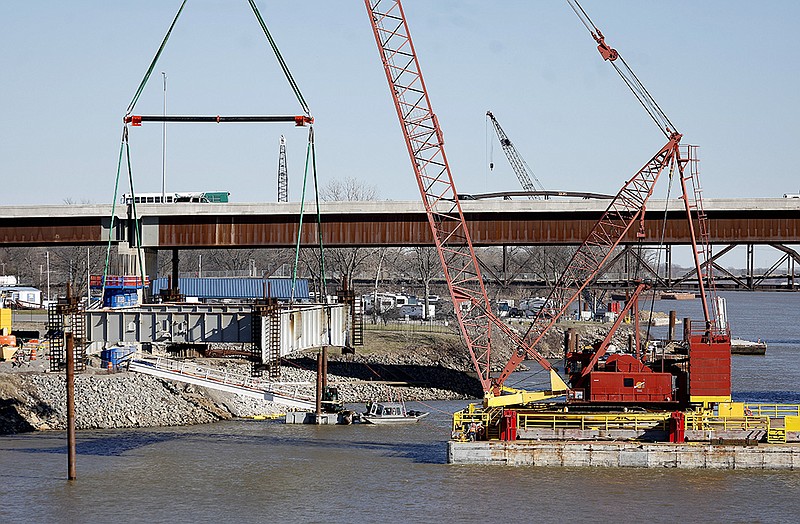An Arkansas Supreme Court ruling Thursday paves the way for state highway builders to use $350 million in voter-approved tax revenue on expanding Interstate 30 in downtown Little Rock as part of the $1 billion 30 Crossing project.
The 6-1 decision by the high court comes 13 months after Pulaski County Circuit Judge Mackie Pierce blocked that spending, siding with a coalition of Little Rock residents, business operators and neighborhood associations who had sued to challenge the legality of the plan by the state Department of Transportation to use that revenue on the six-lane highway.
Pierce found that the Arkansas Constitution prohibits using the money on highways like I-30 when they have six or more lanes.
The Supreme Court ruled Thursday there's no such constitutional prohibition on the way the highway agency plans to use the money in a decision written by Justice Courtney Rae Hudson. The case now goes back to Pierce to reconsider based on the high court's interpretation of the law.
The dissent by Chief Justice Dan Kemp also did not favor the downtown groups. Kemp disputed that they had any grounds to sue since the tax money in question won't even start to be collected until July and even then there's no guarantee that money would be used on Interstate 30.
At issue were differences in two voter-approved amendments, each written by the General Assembly, to pay for road and bridge improvements, Amendment 91 from 2012 and Amendment 101 from 2020. Amendment 91 established a 0.5% (one-half cent per dollar) statewide sales tax with a 10-year expiration date. Amendment 101 made the tax permanent, beginning in July.
A 2020 state Supreme Court holding found that the tax money could not be used on Interstate 630 because there's a prohibition in Amendment 91 on using the funds on highways with more than four lanes. Based on the court's reasoning, Pierce found that prohibition would also apply to the funds collected when Amendment 101 goes into effect in July. He stated that all Amendment 101 did was make the tax permanent.
"The Supreme Court's interpretation of a constitutional provision becomes a part of the provision, so the use of money from Amendment 101 is subject to the same restrictions that apply to Amendment 91," he wrote in his February 2022 decision. "If the General Assembly had intended the tax imposed by Amendment 91 and now to be continued by Amendment 101 to be used for major improvements to six-lane highways, [legislators] could have expressly so stated."
However, Thursday's Supreme Court ruling contradicted Pierce's conclusions because the four-lane cap was not specifically written into Amendment 101 like it was in Amendment 91.
"No language in the intent section of Amendment 101, or in the remainder of the amendment, indicates that the funds collected may only be utilized on four-lane-highway improvements," the 11-page opinion states, noting that the only mention of four-lane highways is a reference to the 2012 amendment. "We note that this is in stark contrast to Amendment 91, which includes the term 'four-lane highway' more than thirty times."
That was the argument that the state's lawyers, attorneys Kevin Crass of the Friday, Eldredge & Clark firm and Rita Looney, the department's chief counsel, had made on appeal, stating that the prohibition from Amendment 91 would not apply since the revenue would come from taxes collected after Amendment 101 goes into effect.
"Here, the plain language of Amendment 101 is clear; no rules of construction are needed to interpret it," they stated in the pleadings. "Unlike Amendment 91, Amendment 101 plainly states that the half-cent sales and use tax is 'to provide special revenue for use of maintaining, repairing, and improving the state's system of highways, county roads, and city streets.'
The General Assembly did not restrict the use of Amendment 101 funding to four-lane highway projects as it did with Amendment 91."
"Today's Supreme Court ruling is a victory for the future of Arkansas' roads," Transportation Director Lorie Tudor, a defendant, said in a news release. "The Highway Commission and ARDOT are grateful for today's ruling that resolved the challenge concerning the use of Amendment 101 funds. It ensures the future flexibility in using Amendment 101 funds as intended by the Legislature, Governor and the voters to maintain, repair and improve the state's system of highways, with no limitation on the number of lanes."
The plaintiffs were the Little Rock Downtown Neighborhood Association, the Pettaway Neighborhood Association, the Hanger Hill Neighborhood Association, the Forest Hills Neighborhood Association, the Coalition of Little Rock Neighborhoods Inc. and Arkansas Communities Association along with downtown residents Joshua Silverstein, Dale Pekar, John Hedrick, Denise Ennett, Rohn Muse and Barbara Barrows.
"We're disappointed in the opinion and we regret that the $350 million of Amendment 101 money is going to be spent widening I-30 through Little Rock and North Little Rock instead of the state's four-way highway system," said plaintiffs' attorney Richard Mays, stating that the high court's ruling appears to end the litigation.
Aside from Tudor and the Transportation Department, defendants included the Arkansas Highway Commission, state treasurer, auditor and governor in their official capacities.
At the Arkansas Supreme Court, the case is CV-22-352.
CORRECTION: The half-cent state sales tax established by Arkansas Constitutional Amendment 91 to fund road and bridge improvements, made permanent by Amendment 101, is 0.5 percent. An earlier version of this story incorrectly described the rate.
